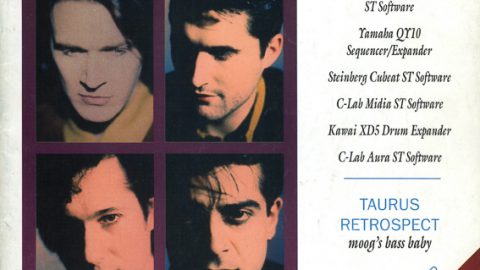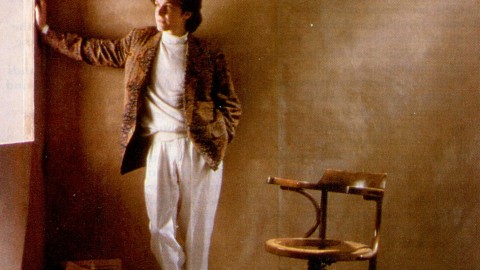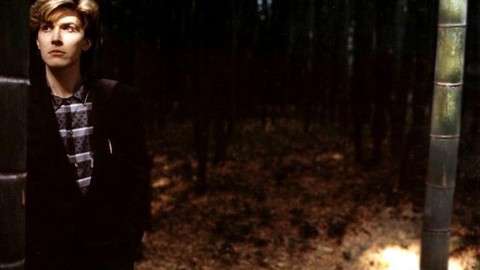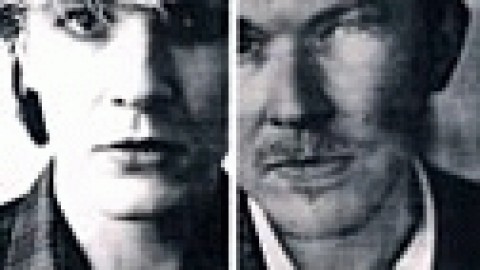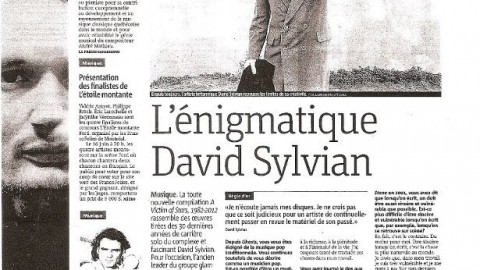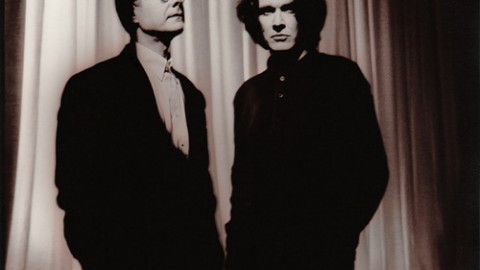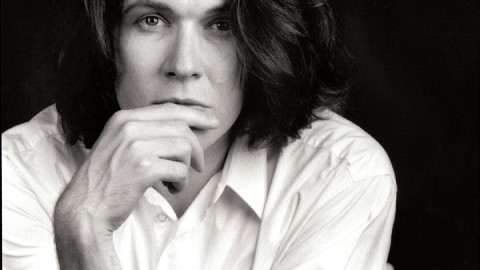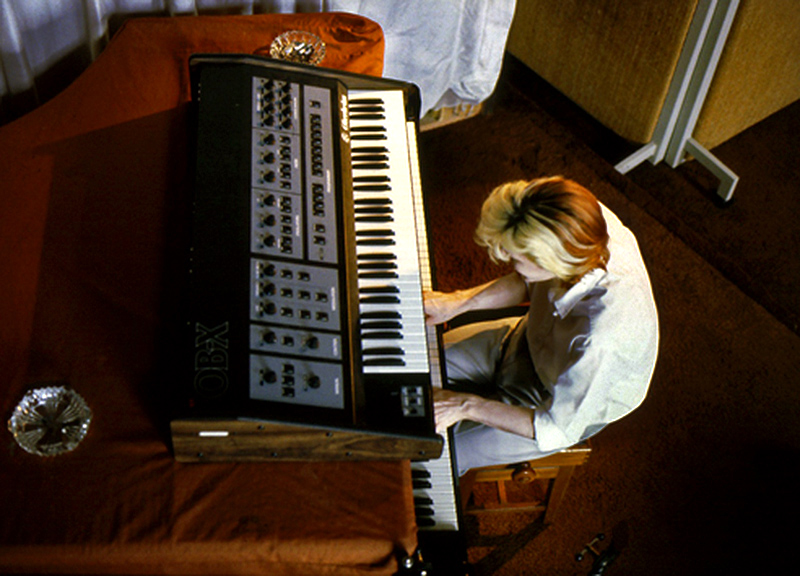
The Roar Of The Drone by Jon Kincaid (Stomp and Stammer, May 1999)
David Sylvian returns.
Most people have never heard of David Sylvian, which is quite unfortunate. In a world where the Offspring can score a number one single, David Sylvian makes music that could be popular but has one distinct disadvantage -his songs are actually interesting.
David Sylvian’s saga could have turned out different. In the mid-1970s he formed the band Japan with his brother Steve and schoolfriends Mick Karn, Richard Barbieri, and Rob Dean. While the band began as a weak New York Dolls glam imitation, Japan eventually evolved into a futuristic vision of what would become the New Romantic movement. In the early ’80s, the band reached its commercial peak, scaling the charts in most of the world. Rife with internal tensions, the band chose to call it a day in the fall of 1982. Had the band continued on, Japan might have attained the heights in the United States of a band that borrowed liberally from them in both sound and appearance, Duran Duran. While some would look back at their commercial peak ,with a nostalgic nod, David Sylvian views the experience as the first steps to where he is today.
“I haven’t listened to the work since I completed it around ’81 or ’82 at the latest,” he admits. “For me, that period was a wonderful time with which to learn, from our failures as well as our successes, and it also helped me a lot to learn how to write and arrange and perform. It helped me to try to understand what I was trying to focus on as a writer, on what my goals should be, though I don’t think I came to grips with that until the band was on its last legs, when I wrote ‘Ghosts.’
“I really draw a very clear line with the music I made with Japan and everything I’ve done since,” he continues. “I can stand by everything I’ve done since ’83. Everything before that was born out of a different set of circumstances and I find iit hard to relate to that material now.”
Sylvian actually made his first “solo” statement while Japan was still in existence, releasing the Bamboo Houses collaboration with Ryuichi Sakamoto in August of 1982. After a further collaboration with Sakamoto on the soundtrack to
the film Merry Christmas, Mr. Lawrence, David released the “Red Guitar” single and Brilliant Trees album, both of which were big sellers in the UK in 1984. From ’84 to ’87, Sylvian released a number of works (the Words With The Shaman and Alchemy: An Index Of Possibilities EPs as well as the albums Gone To Earth and Secrets Of The Beehive) that, while artistically successful, failed to make big impressions chart-wise. While some record labels would have strong-armed a similar act into submitting more commercial releases, David was granted more artistic freedom by Virgin.
“I set [the deal] up that way and Virgin have always been very aware that there’s no use putting pressure on me. I just work at my own speed, at my own pace, and I have my own interests that I pursue, and they’ve allowed me that freedom for seventeen years.”
Secrets Of The Beehive would be the last purely solo album the world would hear from David Sylvian for twelve years. In the time since, David has released collaborative works with Can member Holger Czukay, Robert Fripp, and an ill-fated reunion with Japan under the name Rain Tree Crow. David also used this time to start a family, marrying former Prince protg Ingrid Chavez and having two children by her. His emerging family carries an influence on his first solo album in over a decade, the new Dead Bees On A Cake.
“After the birth of our first daughter, it was wonderful just to spend as much time as I possibly could with her, because the first three years of any child’s life are tremendously important,” Sylvian stresses. “I was working out of this studio built into the attic of our home, so I could make time to get up there and do the work. Nevertheless, I was distracted, there’s no doubt about it. The album was born out of that environment and, in a sense, regardless of how this album’s received out there in the world, it remains as something of a wonderful document for us as a family, because it touches on some truly major events in life.”
Sylvian’s life was changed in another way after marrying Ingrid – he moved to the United States. After living in Minneapolis for five years, David and family moved to California a few years ago. As of yet, Sylvian is unaware of how much America has altered his muse:
“I’ve certainly enjoyed life here to a degree that I never expected to. Before meeting Ingrid, I’d never envisioned America as a possible place that I’d move to. Minneapolis was something like a retreat, culturally and socially, where I just sort of focused in on the family. It was wonderful, kind of like a cleansing of the system. Now I’m in California and I guess I’m more open again to the world around me, opening up a great deal more, soaking a lot more in. I don’t know how much it’s influenced me, though.”
Dead Bees On A Cake continues a pattern Sylvian has used on most of his solo material: rather than being backed by a constant group of musicians, David uses a number of collaborators to keep the pieces from falling into any sort of a pattern. While the new album uses individuals that have worked with Sylvian in one capacity or another before (Sakamoto, Kenny Wheeler, his brother Steve Jansen, his wife Ingrid), Dead Bees introduces some faces that while familiar (Bill Frisell, Marc Ribot, Talvin Singh), have not worked with David previously. Rather than choose musicians on reputation or by word of mouth, Sylvian has a method on deciding with whom to work.
“When I’m arranging a piece of music, it will generally cry out for a certain voice, and that voice has to be within my own frame of reference. So I’m making a connection between a body of work and a particular piece of music, and then it’s a matter of bringing that musician in and seeing if they can make a similar connection,” he explains. “Very often it works out very well, they do make that connection and very little guidance is needed from me. How much freedom they have depends on how they respond to the track and the nature of the track. If there’s a solo, I’ll give them free reign to explore the solo. If I find that it isn’t working to my liking, I’ll give them some other indicators or, as often the case, I’ll let them play five, six different takes of a solo and then I’ll edit that solo to my own liking using the multiple takes. The main thing is remaining true to the track in question and trying to bring the most out of that particular piece.”
Lyrically, Dead Bees On A Cake is a very personal statement. For a number of years Sylvian has had a focus on spirituality. With the addition of his family, David’s lyrics have now taken on a duality, with the search for purpose blurred so thickly between the ethereal and earthly that it acquires a universal appeal.
“The meaning is a combination -spiritual and interpersonal – more often than not,” he says. “In fact, I can’t separate the two and I like that aspect of the work. Not everybody’s going to have the interests that I do and, therefore, when they come to the work, I hope they make it relevant to their own lives in some way. If they see [a song’s lyrics] as a relationship between a man and a woman and read it that way, that’s fine with me because it’s intended on that level as well as other levels.”
Ultimately, one comes away from Dead Bees with a spirit of optimism. While the protagonist of “The Shining Of Things” has a relationship crumble, Sylvian, who here is the protagonist, never loses his faith and is still able to “see the shining of things.” “Thalheim” focuses on a relationship where one of the two is able to make it through life’s troubles with the help of the other and “the sweetest love I’ve ever known.”
Nonetheless, some folks have misinterpreted Sylvian’s lyrics throughout his career, viewing them as having a negative approach to life.
“I do think some people miss the celebratory element in my work,” he agrees. “I’m often in awe of life and I sing songs in praise of life. They’re often celebratory pieces but I have an approach that confuses some people in that, to paraphrase the filmmaker [Andrei] Tarkovsky, I sometimes focus on the shadowy aspects of life to accentuate the light. I think as people we’re very complex emotionally as well as in other ways and I try to reflect that complexity in the work, which is the only way the work can be truly successful… Although a piece of music might emphasize one emotion quite strongly, the others have to be present somewhere in that piece, I think, to some degree.”
The thematic quality and complexity of Dead Bees applies equally to the album’s title, he points out.
“The title came up as a lyric for ‘God Man,’ it immediately appealed to me and I saw it as a possibility for the album but I didn’t understand its significance. And that sort of came to me later in the recording of the album when I saw the relevance of the title to the main themes running throughout the album, like love, devotion, surrender, and ultimately divine intoxication. On the spiritual part, you often hear people talk about the ultimate goal being the death of the ego, merging with the object of desire. The bees became a metaphor for the ego and I like the reference. ‘Dead bees on a cake’ is kind of oblique, a little mundane in imagery, lacking in poetry somewhat, and also humorous. It kind of sat well with me.”
While David Sylvian tends to have a fairly hard-core fanbase ( a la Kate Bush), he says that although he truly appreciates the interest, he doesn’t want to invest in it himself, finding it “unnatural” to have devotion heaped upon him in the press or on the internet. Instead, Sylvian’s fans might get to engage in a more personal show of affection, as David may tour in early 2000. In the past (all the way back to Japan) , Sylvian disliked the touring aspect of the industry. This changed a few years ago when he toured the world with Robert Fripp.
“Working with Robert Fripp, that kind of opened my eyes to the pleasures of live performance. It still takes a back seat to writing and recording which is an area of work I truly enjoy. Nevertheless, I have grown to enjoy that aspect of my work more and more since working with Robert. I think I was influenced by the degree of focus, commitment, and concentration that Robert brought to the stage night after night. I’m actually looking forward to touring after completing work on producing and co-writing an album for my wife and putting together a compilation album that Virgin have been asking for a number of years that would create something of an overview from, let’s say ’82 up until the present time, incorporating the solo work, the collaborative work, and the work I’ve done for others over the years. The tour could become a platform for Dead Bees, for the album that I make with Ingrid, and something of a retrospective tour. And that would be quite exciting to undertake,”
With so much in the planning stages, the future appears to be bright for David Sylvian. New music, his family, a possible tour, yes the year 2000 looks… uh oh. The year 2000. The Millennium. Knowing of David’s investigations into the various aspects of faith and spirituality, perhaps he has some insight on what we can expect…
“I tend to have the same viewpoint as I’ve heard the Dalai Lama express, that it’s just another day,” he says. “If you’re not changing internally, if you’re not developing yourself, then nothing’s going to change externally. Until that begins to happen, nothing major is going to change.”
1999, Stomp and Stammer.
Many thanks to Sheila O’Shea for providing the magazine.

